If you’ve ever had a job in a giant company that’s hundreds or even thousands of employees big, you may know well that a conflict of interest comes with the territory. Relationships go sour. Your work starts to experience ‘hiccups’. And thus you start looking for a way out, only to find you’ve been replaced with someone less qualified than you.
As user u/Pee_A_Poo recently shared in his relatable r/antiwork story, his plan to get as far away from his former manager went south and he resigned. But the bamboozling part of this story lies in the fact that not only was this worker turned down from the same position, but was expected to give pointers to the employee who filled his shoes. Talk about a lack of respect, right?
It’s one thing to be replaced by a less qualified employee
Image credits: Timur Weber (not the actual photo)
But an entirely different situation when you’re expected to give pointers on your way out
Image credits: Lisa Fotios (not the actual photo)
Image credits: Pee_A_Poo
If you’ve been with us for quite a while now, reading experiences like this may not be anything new to you. And yet, for those who are familiar with the aftertaste of getting laid off or being replaced by a younger, smarter Ivy League individual – it hits too close to home no matter how many of these stories we have covered.
A two-decade-long research effort in Germany once revealed that getting laid off is one of the most devastating life events a person can go through. The study, which has been tracking the lives of a huge chunk of the population for almost 20 years, found that losing one’s job not only triggers immediate distress for the individual and their loved ones but also leaves a pretty big emotional crater, so to speak.
Of course, u/Pee_A_Poo is not the only one who’s been recently wronged by his company. Just in the past year, the workforce across the US has seen a massive wave of layoffs that has left many previously secure workers without a stable paycheck. This trend has been particularly pronounced in the last four months, with thousands of people being let go despite feeling confident in their positions.
In the tech sector, over 164,000 workers were laid off in 2022 alone. Not to mention an additional 171,000 that were terminated from their positions this year, according to tracking site Layoffs.fyi. Other industries, including finance, consumer retail, media, healthcare, and pharmaceuticals have also been hit hard by redundancies. Big players such as Goldman Sachs, Morgan Stanley, and Citigroup have slashed thousands of positions in response to the economic downturn. And we’re not even halfway through the year yet.
The worst part about losing a job, then, is not the financial uncertainty – although, it sure adds to the overall panic – but the loss of a structured schedule and having social bonds which otherwise were a big part of our lives (at least for most of us). According to one study done by HP workplace, 4-in-5 employees in the United States feel happier due to the relationships they have with their colleagues at work. Additionally, 69% of workers believe that these close connections contribute to their success in the workplace. Naturally, being sacked from a job is a huge blow just because of the friendships it might ruin.
In order to find out how one should cope with a sudden loss of work, Bored Panda reached out to Ronald E. Riggio, a professor of leadership and organizational psychology at Claremont McKenna College in Claremont, California, who believes that in this day and age, everyone should be prepared for the worst when it comes to career. “Anticipate the ‘what if’ of losing a job, and have that Plan B (or Plan C, D, etc.) in mind,” he suggested in an email. “Even if you are happy in your current job, you should always carefully explore possibilities for an even better or more rewarding job/career. Keep abreast of opportunities in your field, just in case you are let go.”
It’s worrying to read that an average of 54,966 American employees have been laid off or fired each day (including weekends and holidays) in the first two months of 2017. Meaning that you can always be sacked from your job as quickly as a finger snap from Thanos, the mega-villain of “Avengers”. The good news is that 91% of people eventually bounce back, as this study showed. As Riggio suggests, “use this as an opportunity to explore a completely different line of work (particularly if you were unhappy or had reservations about your previous career history and path).” You know how it goes: when one door closes, another opens.
Of course, it’s only understandable that losing one of the most important (and paying!) rituals of our daily lives will bring us down. That goes without saying. And so, there’s a chance you’ll give up on the job market and throw your hands in the air. Or worse: turn to hard stuff to ease the pain, just like 1-in-5 Americans who have been laid off from their position usually do, according to data. “The worst thing would be to despair, to give up, and/or to turn to alcohol or drugs in order to cope,” Riggio argued, suggesting instead a recollection of your recent accomplishments.
“Turn the tragedy into an opportunity to reflect on your work history and the accompanying knowledge and skills you learned from your past job(s),” he said, “take pride in what you have accomplished from your past positions and use that renewed optimism and energy to set out on your job search.”
Most people felt for the author and suggested that he shouldn’t drag the new employee into this
Others, however, thought this might be a valuable lesson in elitism for the author
My sister-in-law worked in a 2 person office. SIL was the assistant. Boss quit. SIL applied for boss position, and covered both jobs while company went through interview process. They hired someone from outside, with no experience in that field, and wanted SIL to train her new boss. SIL quit shortly after.
I feel like there’s a lot more to this and the op just “isn’t in the know.” I’ve been on the hiring end of things before and I’ve been told by higher ups, “Don’t hire so-and-so because the team he’s on needs him and he’s not easily replaceable.” It sucks. But I feel like something like that is at play here.
If this is the case, the higher-ups are bunch of morons. It's very likely the empoyee will feel undervalued and end up leaving the company. They'll end up having to replace someone "not easily replaceble" anyway.
Load More Replies..."Yes, I'm the 'go to' guy all right, and this 'go to' guy says your manager can go to hell."
My sister-in-law worked in a 2 person office. SIL was the assistant. Boss quit. SIL applied for boss position, and covered both jobs while company went through interview process. They hired someone from outside, with no experience in that field, and wanted SIL to train her new boss. SIL quit shortly after.
I feel like there’s a lot more to this and the op just “isn’t in the know.” I’ve been on the hiring end of things before and I’ve been told by higher ups, “Don’t hire so-and-so because the team he’s on needs him and he’s not easily replaceable.” It sucks. But I feel like something like that is at play here.
If this is the case, the higher-ups are bunch of morons. It's very likely the empoyee will feel undervalued and end up leaving the company. They'll end up having to replace someone "not easily replaceble" anyway.
Load More Replies..."Yes, I'm the 'go to' guy all right, and this 'go to' guy says your manager can go to hell."

 Dark Mode
Dark Mode 

 No fees, cancel anytime
No fees, cancel anytime 




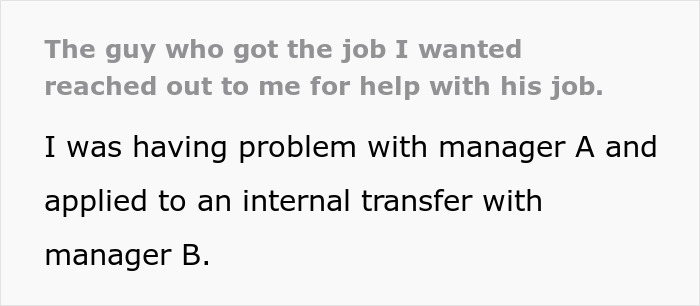
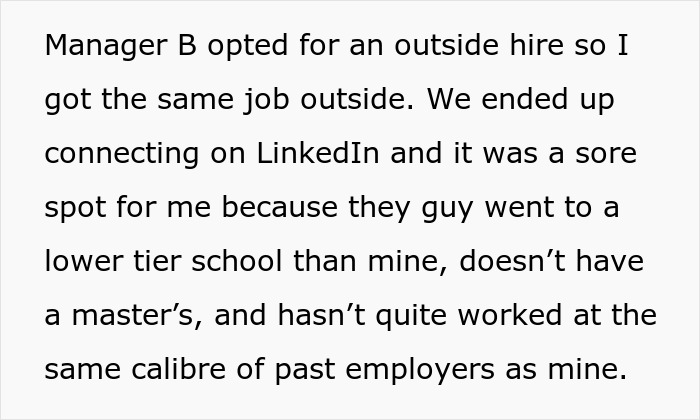
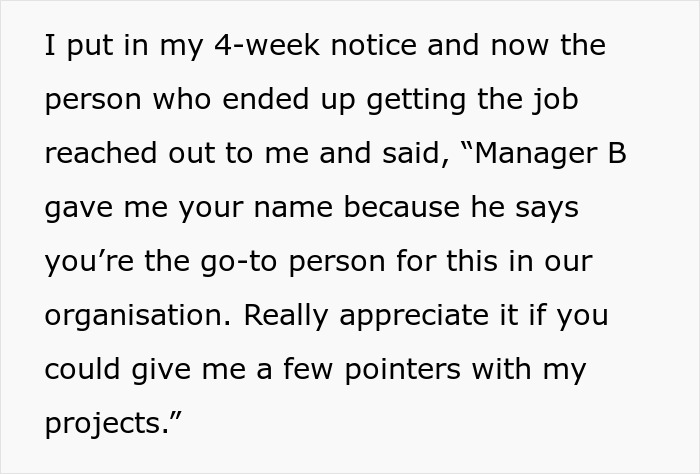
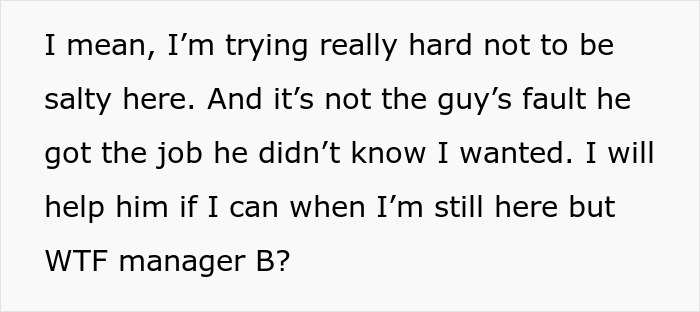

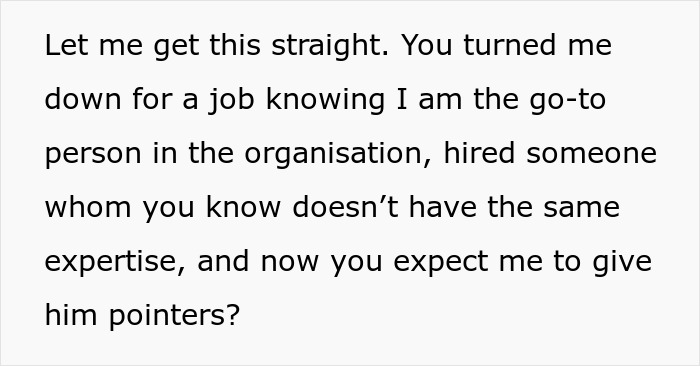
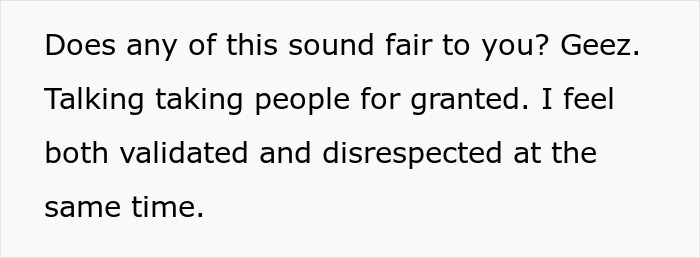
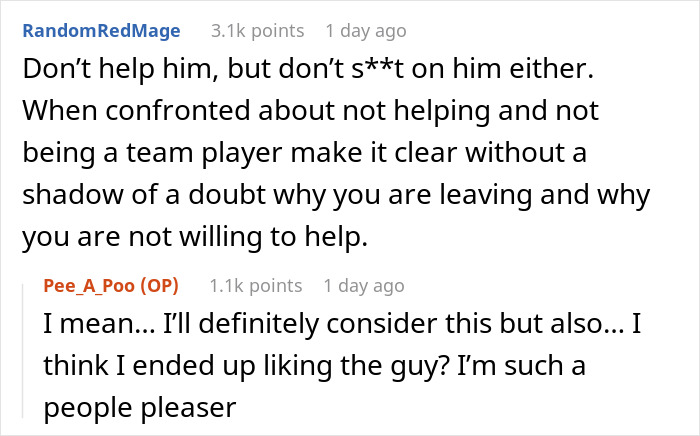
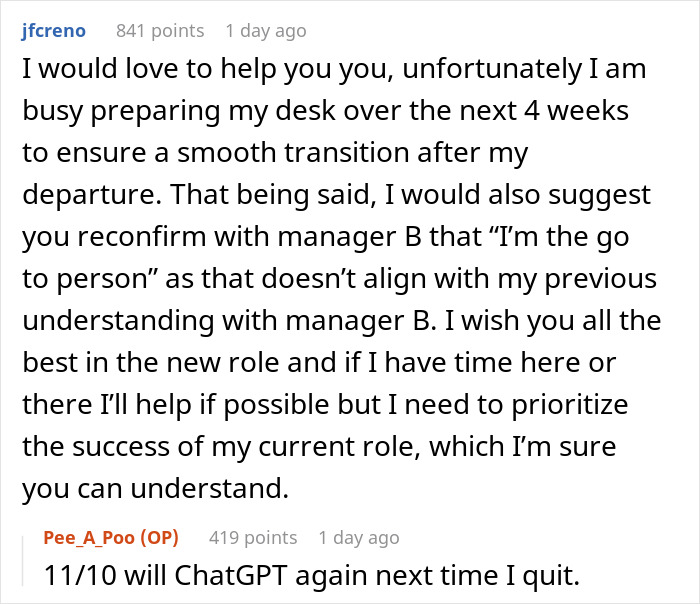
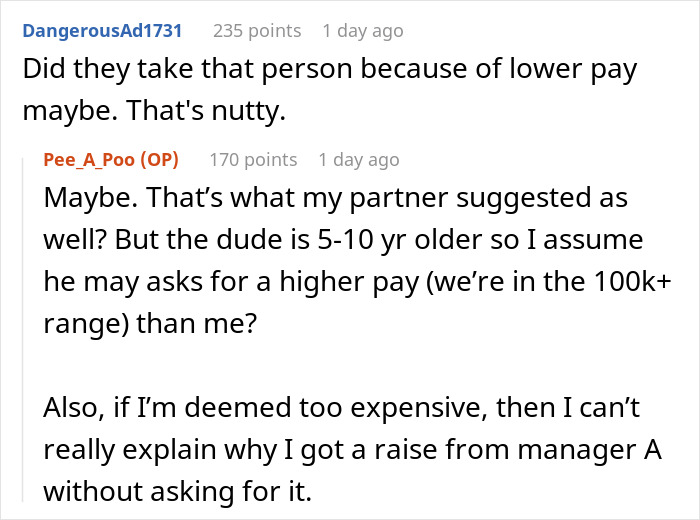

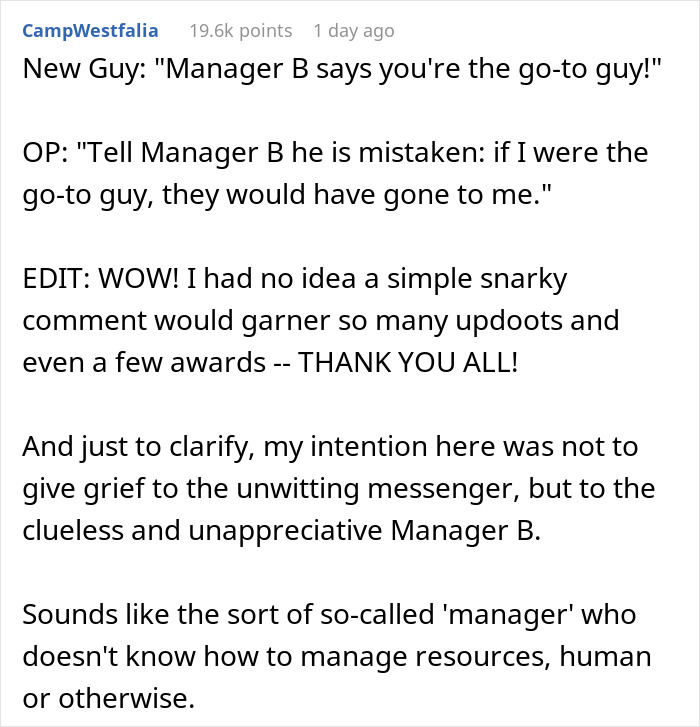
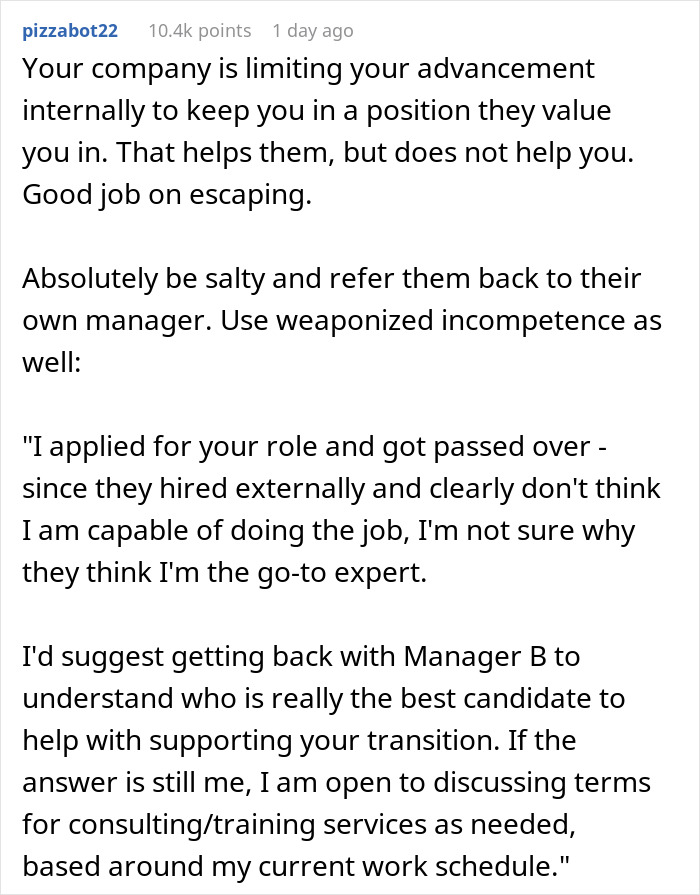



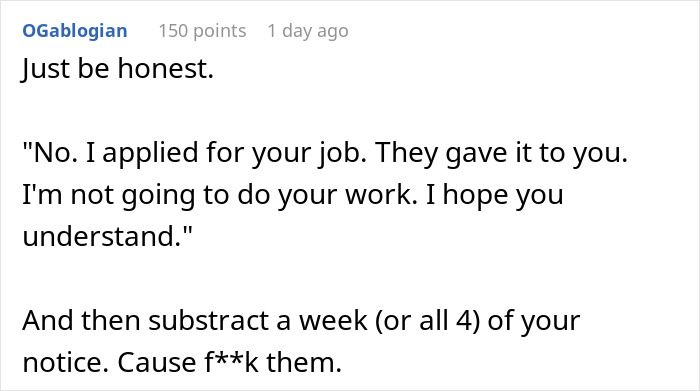
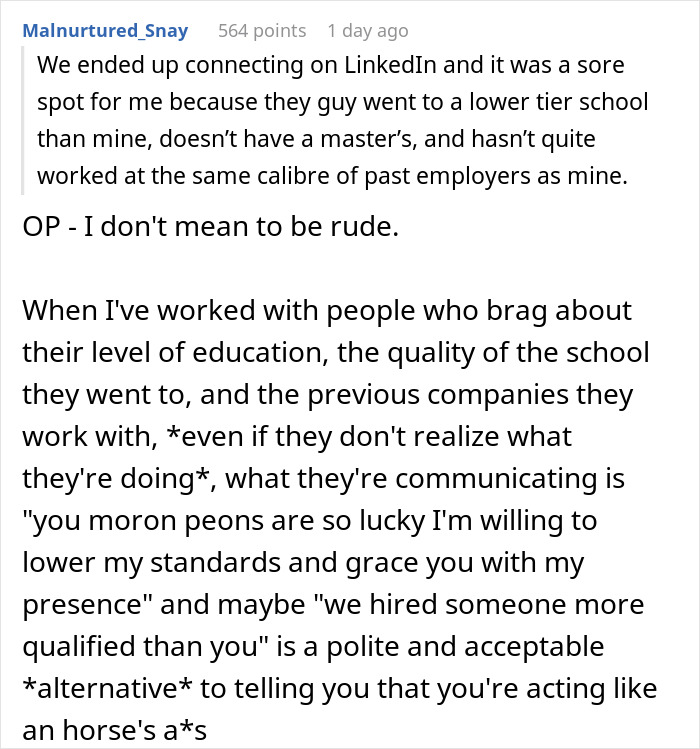

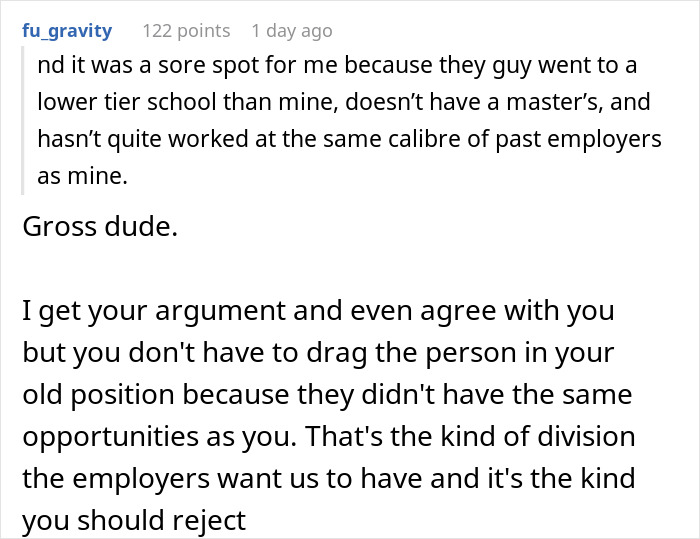
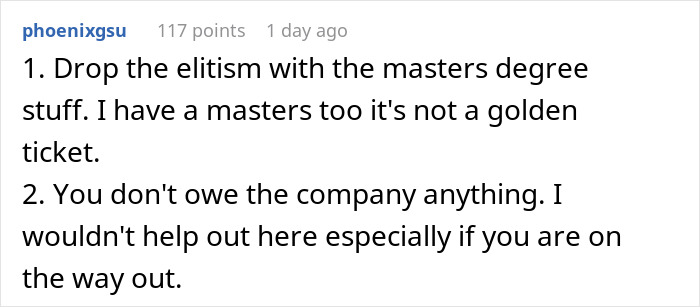

































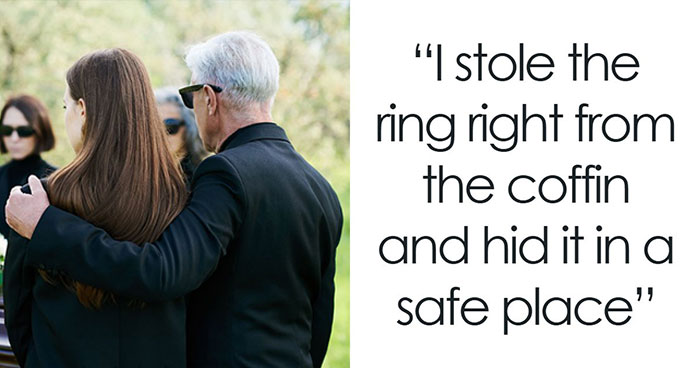











73
34